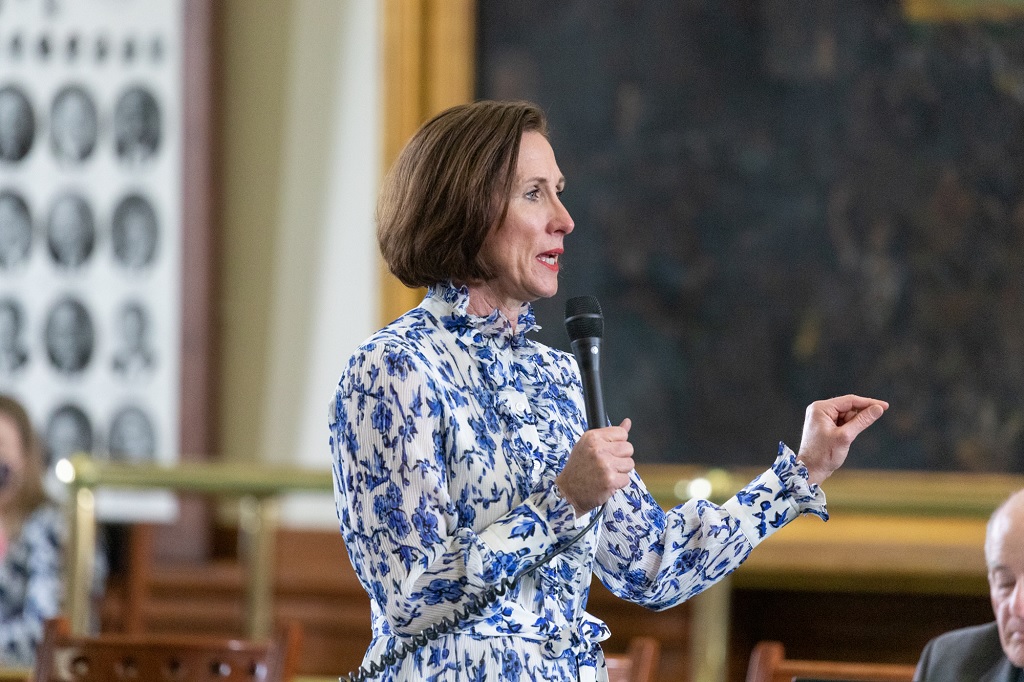SEN. KOLKHORST ADDRESSES SB 147 CONCERNS
A bill filed by State Senator Lois Kolkhorst restricting certain foreign ownership of Texas lands has the support of Governor Greg Abbott, but has also drawn opposition.

floor during the 2021 Legislative Session.
(courtesy Office of Lois Kolkhorst)
Senate Bill 147 would prohibit citizens, businesses or entities from China, Iran, North Korea and Russia from making land purchases in Texas. Gov. Abbott has said he intends to sign the bill should it come to him, but the bill has come under scrutiny from some lawmakers and members of the public who claim it is discriminatory.
Kolkhorst said the bill will be clarified to reflect that private, legal United States citizens and permanent residents will still be able to purchase land.
Kolkhorst said the bill builds off of SB 2116 from the 2021 Texas Legislature, which prevents those four countries from entering into contracts or agreements in connection to critical infrastructure in Texas. That bill passed unanimously, and she questioned why some legislators are critical of this new bill after voting for the previous one. She also said there are 22 other states that have some form of restriction on foreign national land ownership.
Kolkhorst said this would not stop anyone from doing business in Texas, as they could still lease buildings. She reiterated that this is not a blanket on all foreign countries and is not meant to target any certain ethnic group, only the countries that are considered “hostile to Texas and the United States.”
In her press release first announcing the filing of SB 147, Kolkhorst pointed to the purchase in 2021 of over 130,000 acres by a Chinese-controlled firm for a wind farm near Laughlin Air Force Base in Del Rio. She said the bill is meant to provide “basic safeguards to ensure Texans remain in control of Texas land.”
Other bills similar to Kolkhorst’s have been introduced in the Senate and the House. Senator Donna Campbell (R-New Braunfels) filed SB 552 to ban citizens and companies from the same four countries from purchasing or leasing agricultural land in Texas. Representative Cody Harris (R-Palestine) filed HB 1075 to prevent any foreign governments or companies controlled by a foreign government from owning agricultural land.
Kolkhorst said SB 147 has yet to be referred to committee and anticipates debates on the bill later this spring.



This bill harms tens of thousands of Visa workers. Many of them are on path to U.S. citizens. It may take more than 10 years for them to get permanent residence. Before they get their citizenship or permanent residences, they have been paying tax,contributing to this country for years. That’s why this bill violates equality.
Beside that this bill can’t prevent the hostile countries from operating in Texas’ land. They can let some spies register some companies in U.S. and buy or lease land in Texas in the name of those agent companies. If the government wants to prevent hostile activities in Texas, the government has to do lots of censorship.
So under this bill we can keep China from buying land near a military installation but it’s okay for them to lease it and then go on to do whatever they want?
That doesn’t make any sense. Law enforcement and intelligence agencies can track ownership records and transfers through financial institutions to figure out who the owners are, keep tabs on them and their associates, and to seize those assets and a whole lot of other assets in the event of crime or war.
Leases can happen without any oversight at all and not draw attention, can be paid in untraceable cash, can be hidden off the books without any traceable public record or tax liability, and there’s no particularly severe downside to a tenant if the lease is terminated in the event of crime or war.
What we should be doing is forcing hostile countries to buy property here if they want to conduct business here. That way their assets are collateral on their good behavior and every intermediary an a transaction can be flagged for ‘Know Your Client’ laws.
Come on lawmakers, you can do much better than this.
If we were really serious about stopping China,Iran,North Korea, and Russia we would knock them off the stock market where it really counts,but we would take down a of our own crooks too. I like this Bill 147 but in fact its weak cause these foreign fat cats just buy citizenship EB-5 investor visa and purchase the land anyway. Build the wall declare the Cartels an enemy of the State and start shooting them the second they step foot on Texas soil. We are being invaded by an enemy not that hard to understand.
Regarding the Cartels…it’s interesting that millions of young men were drafted into service to go fight a war clear across the world that had a disastrous outcome…50,000 died in conflict…many more live’s were ruined due to the affects they suffered. But we won’t use the military to protect our boarder and combat the cartels…wipe them off the face of the earth. You think the fact that the cartels pay off officials has anything to do with it? All we get from government is talk…no action. All about money/power
There are thousands and thousands of working visa holders, who work hard, pay tax, help build the parks and roads, raise their kids, support their neighbors, and condemn evil as all citizens do.
The US is built upon the spirit of Mayflowers and equality.
“On his deathbed in 1821, Austin asked his son Stephen to carry out his plans, and Mexico, which had won independence from Spain the same year, allowed Stephen to take control of his father’s grant. Like Spain, Mexico also wished to encourage settlement in the state of Coahuilay Texas and passed colonization laws to encourage immigration. Thousands of Americans, primarily from slave states, flocked to Texas and quickly came to outnumber the Tejanos, the Mexican residents of the region. The soil and climate offered good opportunities to expand slavery and the cotton kingdom. Land was plentiful and offered at generous terms. Unlike the U.S. government, Mexico allowed buyers to pay for their land in installments and did not require a minimum purchase. Furthermore, to many whites, it seemed not only their God-given right but also their patriotic duty to populate the lands beyond the Mississippi River, bringing with them American slavery, culture, laws, and political traditions.”—–https://courses.lumenlearning.com/suny-ushistory1os2xmaster/chapter/independence-for-texas/
So…same comments go to the protection of those visa holders.